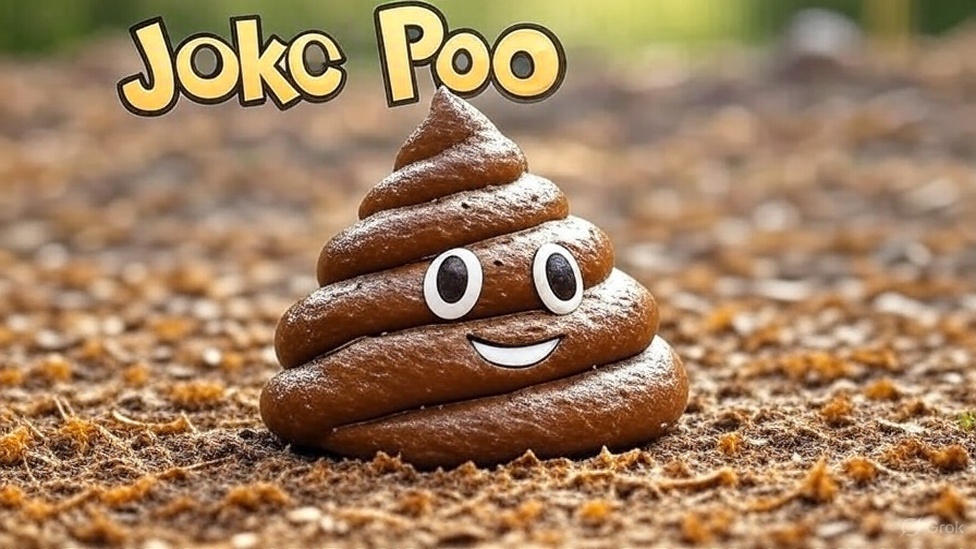During a TV interview on a news channel, a billionaire was asked how he became so successful and amassed so much wealth at such a young age.
The billionaire replied, “When I was 17 and in high school, I bought a pack of $1 pencils and sold each pencil for $2. Then I used that money to buy two more packs and then again sold those pencils for $2 each. I kept doing that – buying more packs and selling each pencil for $2 then $3 and so on — until I turned 23…"
The interviewer leaned in, impressed by what she was hearing.
"… That’s when my grandfather died and left me a billion-dollar fortune in his will "
Joke Poo: My Startup Success
During a tech conference keynote, a young CEO was asked how she built her revolutionary social media platform and achieved a multi-million dollar valuation by age 25.
The CEO replied, “When I was 18 and in college, I developed a simple app that let people rate their dorm’s cafeteria food. I sold it to the University for a few hundred dollars. Then I used that money to hire a friend to enhance its user interface and sold it to another college for more than double the price. I kept doing that – improving the app, adding features, selling it to more schools for progressively higher prices… until I turned 25…”
The audience leaned in, captivated by her entrepreneurial spirit.
“… That’s when my dad sold his hedge fund to launch the app nationally with massive funding and marketing campaign”
Alright, let’s dive into this comedic gold!
Joke Dissection:
- Premise: A young billionaire is asked about the secret to his success.
- Setup: He gives a plausible, if simplistic, description of starting small and scaling up a business (buying and reselling pencils). This sets the expectation of self-made success through hard work and entrepreneurial spirit.
- Punchline: The entire narrative of pencil sales is a red herring. His true wealth comes from a huge inheritance, making his earlier explanation irrelevant and absurd. The punchline subverts the expectation of a rags-to-riches story.
- Humor Type: Irony, anti-climax, exaggeration (the ridiculous scale of pencil profits needed to become a billionaire).
Key Elements:
- Billionaire: Symbol of immense wealth and often, a perception of self-made success.
- Pencils: Represents humble beginnings, small-scale business ventures, and the “grind.”
- Inheritance: The unexpected, easy path to wealth that undermines the myth of pure meritocracy.
- The Interview: Provides the framework and context of the joke.
Comedic Enrichment:
Let’s use some of these elements to spin off something new. I’ll aim for a “Did You Know?” observation that adds a layer of absurdity and irony:
New Observation:
“Did you know that, adjusted for inflation, the actual cost of a single pencil has only ever increased by a fraction of a cent since the 1800s? So, unless our billionaire friend had access to some kind of pencil time machine, or perhaps discovered a lost deposit of pure graphite, his ‘pencil empire’ sounds less like a business venture and more like an advanced form of money laundering.”
Why it works:
- It takes the (deliberately ridiculous) “pencil empire” premise of the original joke and adds a layer of factual absurdity.
- The “money laundering” suggestion is unexpected, upping the ante on the punchline by adding a further layer of irony (from “humble beginnings” to “maybe, a criminal enterprise”).
- It maintains the core comedic theme of subverting the idea of a straightforward, self-made success.
- The “pencil time machine” is simply funny, and calls out how ridiculous the first story was.
I could also create a new joke:
“A young software engineer boasted to his mentor, ‘I wrote this app in my basement last week and I’ve already made $10 million!’
The mentor replied, ‘Wow! That’s amazing! How did you monetize it?’
‘Well,’ the engineer said, ‘My dad is a venture capitalist and he just happens to hate his current portfolio company. So he used the money he set aside for my college as funding. But, hey, a win is a win!'”
Why this works:
- It hits at the same themes of:
- “self-made” success is often due to money already in the family.
- Modern, relevant punchline relating to current tech industry.
- The “a win is a win” line ties the story together with a humorous tone.


